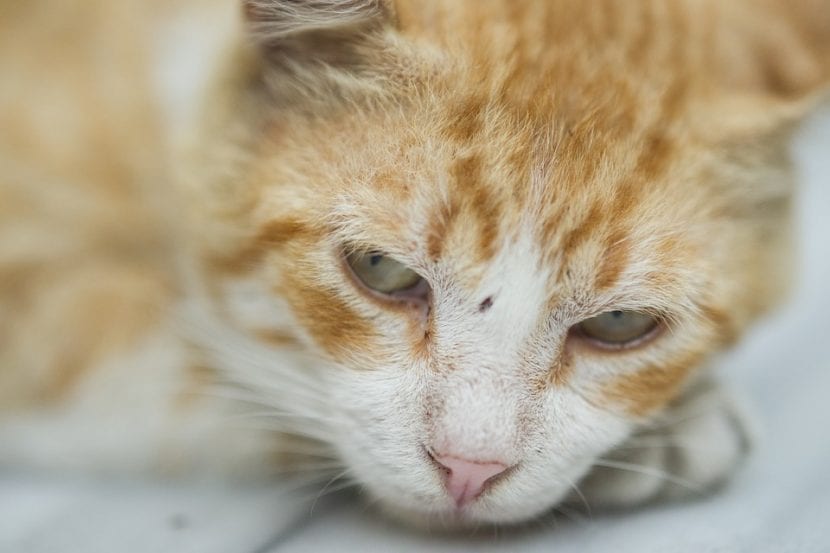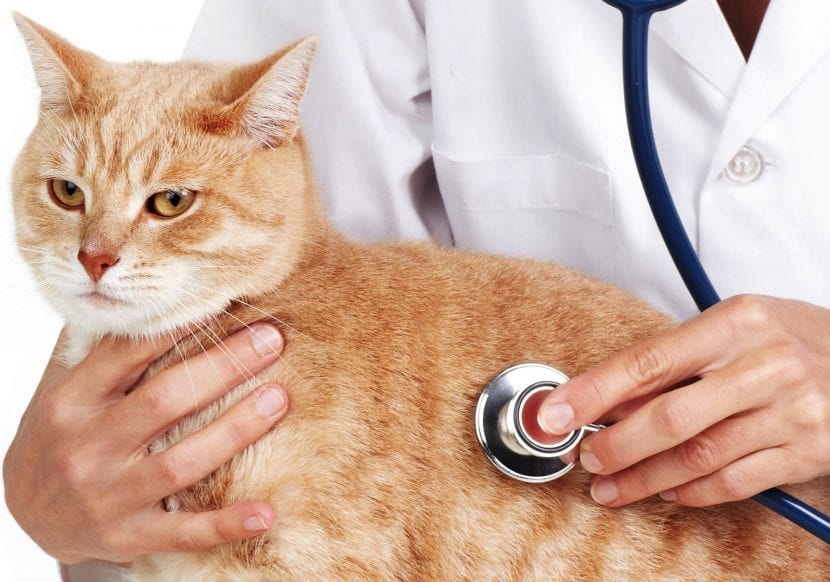
Who has not ever heard of asthma? This disease is the most serious type of allergy, since with each attack the affected person can have serious problems breathing normally. Unfortunately, it also affects cats ... and it is also very dangerous.
Feline asthma is something that both the furry and their family have to learn to live with, as treatment is usually forever. But, What is it and how is it treated?
What is it?
Asthma characterized by narrowing of the bronchi, which are thin tubes that go from the windpipe to the lungs. There are different types, but in the case of cats it is bronchial, which is why it is known as bronchial asthma, allergic bronchitis or chronic bronchitis, since it affects the level of the bronchi. As if that were not enough, it is chronic and progressive, which means that over the years the symptoms worsen.
Crises occur when the immune system of the furry overreacts to the presence of an allergen, something that causes inflammation of the bronchial tissues. What this does is cause spasms in the muscles of the airways, making it difficult for animals to carry air from the inside to the outside of the lungs.
Depending on the severity, feline asthma is divided into four categories or levels:
- MarginalCats have symptoms intermittently, but not every day and they don't interfere with their lives either
- ModerateSymptoms do not occur every day, but when they appear they weaken them.
- SevereSymptoms occur every day and are very debilitating.
- Potentially deadly: seizures not only occur daily, but also the construction of the airways is such that cats cannot breathe.
What are the symptoms?
The symptoms are very varied and can be confused with other diseases, so it is sometimes difficult to know if they have asthma or something else (like a hairball in the stomach, for example). Now if they have dry cough y the sound like a sharp sigh (called hissing) are classic symptoms of feline asthma. But beware, there may also be others much more subtle, such as discouragement, the progressive loss of interest in the game, having an increasingly sedentary life, and others that only the family could notice.
In any case, even if cats only have a dry cough as a symptom, this is more than enough reason to take them to the vet, especially if it is a cough that occurs for more than two or three weeks.
What causes it?
The causes of asthma are the same as those of the "common" allergy. Anything can trigger a crisis:
- Mold
- Cigarette smoke
- Dust mites
- Scented cat litter, not forgetting the dust
- Vapors from the products we use to clean, and aerosols
- Grass and pollen
- Chimneys and candle smoke
- Some foods
In addition, it must be borne in mind that it can affect any cat, regardless of age and gender. But it is true that it appears more frequently in young animals, from 1 to 3 years old.
How is it diagnosed?

As we said, the symptoms are similar to those of other diseases and / or problems, so it is important to take cats to the vet as soon as we see that they are not feeling well. Once there, the first thing they will do to you is a Physical exam, but then they can choose to ask them:
- a chest x-ray: to see how that area is.
- un transtracheal lavage: It can be useful when the radiograph is normal.
- a bronchoscopy: A small camera is introduced to the cat through the bronchi, so the inside of the lungs can be seen.
But it must be said that sometimes the easiest way to know if they have asthma or not is by trial and error: by treatment. If this works and the seizures stop or are well controlled, it is because the diagnosis is correct.
How is it treated?
The medications that are given are corticosteroids, either in pills, injection or by inhalation, the latter being the most common because they are less harmful to the body. But it is also interesting to consider traditional veterinary medicine, since acupuncture for example helps reduce the frequency and intensity of asthma episodes.
How to care for a cat with asthma? My experience
Being told by a vet that your precious, cuddly and cuddly cat has asthma is not news to be heard. So, it is extremely important to follow the advice offered by the professional, since otherwise what will happen is that the disease will take away our furry beloved before its time.
But What tips are those? Well, basically living with an asthmatic cat means that you have to give him his medication every time he touches him, but you also have to:
- No Smoking. It's not healthy for him or for you.
- Buy a sand that does not release dust and is not aromatic.
- Use ecological cleaning products.
- Try not to use the fireplace. Better an electric brazier so that the cat does not have an asthmatic attack.
- Reduce or eliminate the use of aerosols.
- Invest in air purifiers, especially if there is someone at home who smokes.
- If the cat is overweight, try to regain its ideal weight since excess fat makes the lungs work more.
- Take care of it as it deserves, avoiding tension and stress.

I hope this article has been useful to you. 🙂